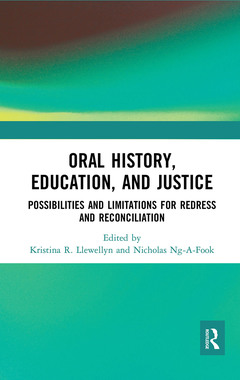Oral History, Education, and Justice Possibilities and Limitations for Redress and Reconciliation
Coordonnateurs : Llewellyn Kristina R., Ng-A-Fook Nicholas

This book addresses oral history as a form of education for redress and reconciliation. It provides scholarship that troubles both the possibilities and limitations of oral history in relation to the pedagogical and curricular redress of historical harms. Contributing authors compel the reader to question what oral history calls them to do, as citizens, activists, teachers, or historians, in moving towards just relations. Highlighting the link between justice and public education through oral history, chapters explore how oral histories question pedagogical and curricular harms, and how they shed light on what is excluded or made invisible in public education.
The authors speak to oral history as a hopeful and important pedagogy for addressing difficult knowledge, exploring significant questions such as: how do community-based oral history projects affect historical memory of the public? What do we learn from oral history in government systems of justice versus in the political struggles of non-governmental organizations? What is the burden of collective remembering and how does oral history implicate people in the past? How are oral histories about difficult knowledge represented in curriculum, from digital storytelling and literature to environmental and treaty education?
This book presents oral history as a form of education that can facilitate redress and reconciliation in the face of challenges, and bring about an awareness of historical knowledge to support action that addresses legacies of harm. Furthering the field on oral history and education, this work will appeal to academics, researchers and postgraduate students in the fields of social justice education, oral history, Indigenous education, curriculum studies, history of education, and social studies education.
Introduction: Oral History and Education: Hopes for Addressing Redress and Reconciliation
Kristina R. Llewellyn, Nicholas Ng-A-Fook
Section 1: Public Pedagogy, Memory, and Redress
Chapter 1: Re-Storying and Restoring Pacific Canada: Alternative Pasts for a Changing Present
Henry Yu, Sarah Ling, Denise Fong
Chapter 2: Witnessing Exclusion: Oral Histories, Historical Provenance and Antiracism Education
Timothy J. Stanley
Chapter 3: Justice Sang the Adaawk: Restor(y)ing Historical Consciousness
Aparna Mishra Tarc
Chapter 4: The Power of Silence: Personal Memories and Historical Consciousness in Experiences of Racism in Canada
Pamela Sugiman
Chapter 5: Cracks in the Foundation: (Re)Storying Settler Colonialism
Jennifer A. Tupper
Section 2: Unsettling Pedagogies, Curriculum, and Reconciliation
Chapter 6: Restorying Settler Teacher Education: Truth, Reconciliation, and Oral History
Kiera Brant-Birioukov, Nicholas Ng-A-Fook, Kristina R. Llewellyn
Chapter 7: What Does it Mean to Story our Shared Historical Present? The Difficult Work of Receiving Residential School Survivor Testimony as Bequest
Lisa K. Taylor
Chapter 8: The Teacher’s Call to Act Beyond Childhood Innocence: Picturing Reparation in Shi-shi-etko and Shin-Chi’s Canoe
Lisa Farley, Tasha Henry
Chapter 9: Restorying South Africa: A Digital Storytelling Praxis for Developing Historically Conscious Teachers
Kristian Stewart
Chapter 10: Developing Curriculum through Engaging Oral Stories: A Pedagogy for Reconciliation and Eco-Justice-Oriented Education
Dan Roronhiakewen Longboat, Andrejs Kulnieks, Kelly Young
Kristina R. Llewellyn is Associate Professor in the Department of Social Development Studies at Renison University College at the University of Waterloo, Canada.
Nicholas Ng-A-Fook is a Professor of Curriculum Theory and the Director of the Teacher Education program at the University of Ottawa, Canada.
Date de parution : 06-2021
15.2x22.9 cm
Disponible chez l'éditeur (délai d'approvisionnement : 14 jours).
Prix indicatif 48,88 €
Ajouter au panierDate de parution : 09-2019
15.2x22.9 cm
Thème d’Oral History, Education, and Justice :
Mots-clés :
Young Man; Canadian History Textbooks; Nicholas Ng-A-Fook; Digital Oral Histories; Kristina Llewellyn; Residential Schooling History; oral history; Specific Racist Measures; historical consciousness; TRC’s Final Report; public education; Indo-Canadian Community; social justice education; cultures of reconciliation; Japanese Canadians; antiracist education; Indian Residential School; cultures of redress; Residential School Survivors; historical understanding in education; Indian Residential School Systems; post-colonial theory; Digital Storytelling; indigenous studies; Mishra Tarc; historical injustices; Chinese Canadian; social studies; Japanese Canadian Community; oral history education; Curricular Redress; Canadian Truth and Reconciliation Commission; Story Circle; Survivor Testimonials; Digital Story; Digital Storytelling Project; Indigenous Settler Relations; Teacher Candidates; Settler Consciousness; Historical Harms
